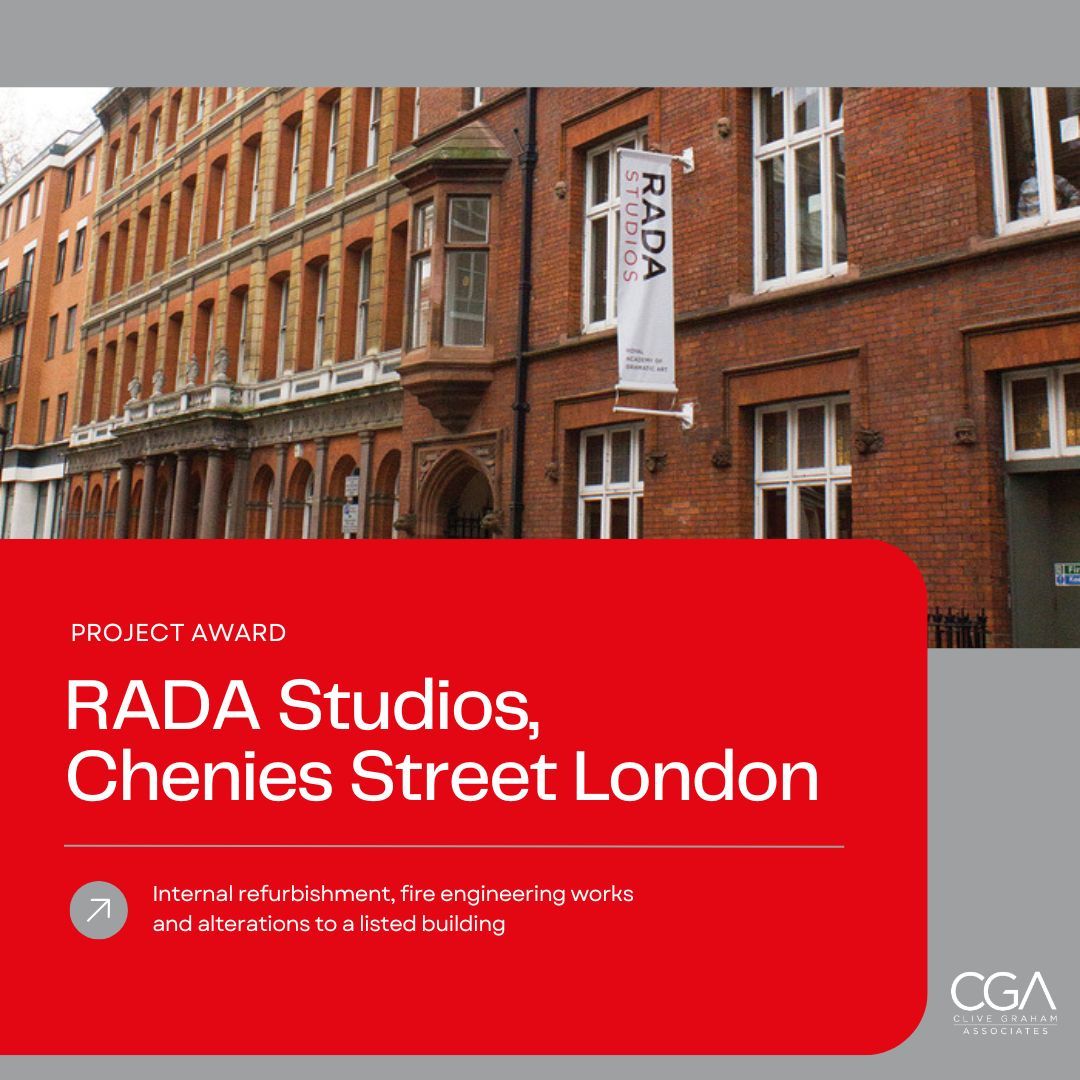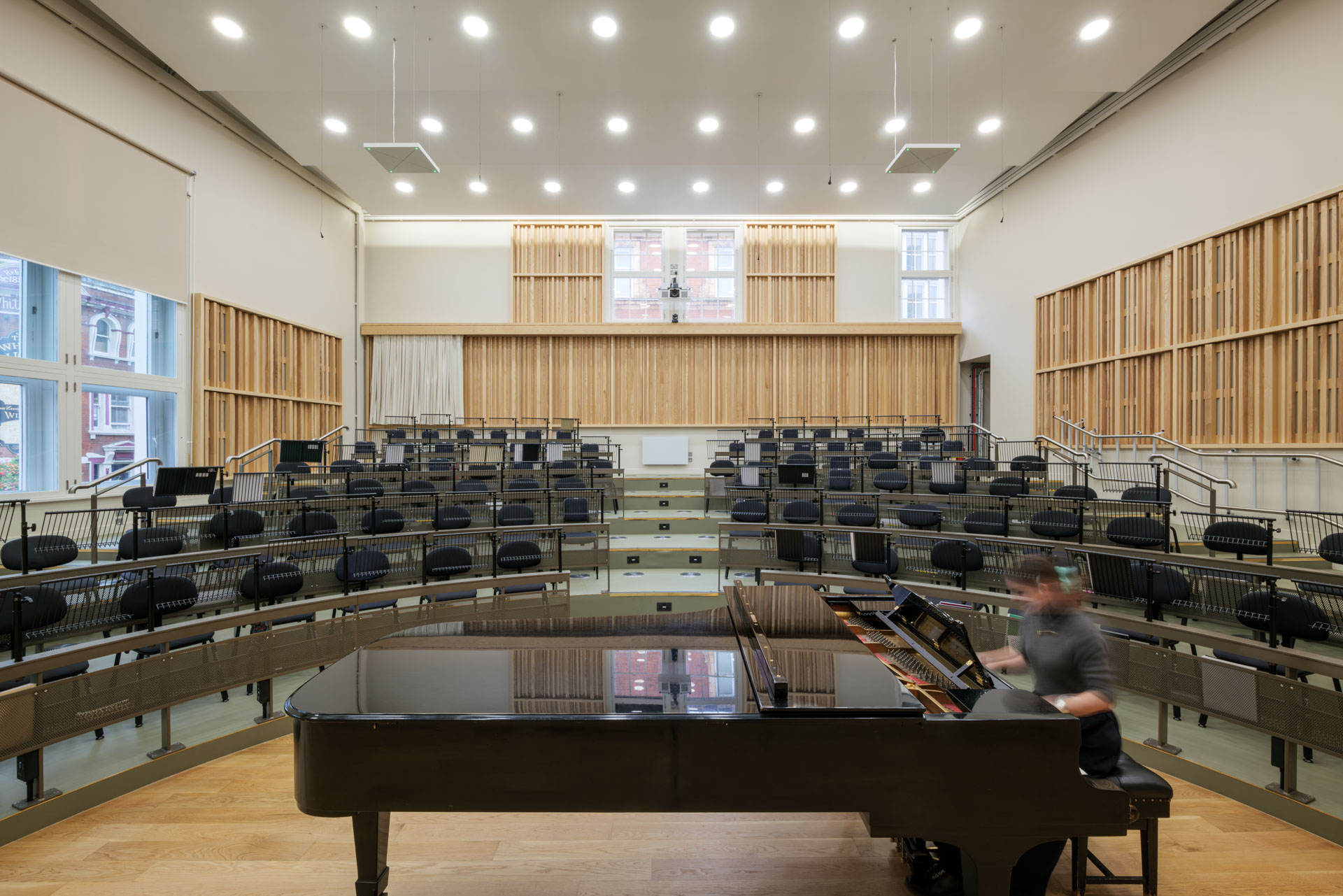Meeting the Moment in Arts and Culture
Post-pandemic, the UK’s arts institutions are facing a quiet but urgent transformation. Years of underinvestment, stricter fire regulations, and growing pressure to improve accessibility have brought retrofit to the forefront. Not just as a building strategy, but as a safeguard for the future of cultural spaces.
At CGA, we’re seeing this shift play out across the sector. Our recent retrofit and compliance wins with the Almeida Theatre and RADA Studios are part of a wider trend: upgrading the hidden infrastructure of the arts, while protecting the public, staff, and performers who bring these buildings to life.
RADA Studios: Fire Compliance in a Listed Setting
At 16 Chenies Street, CGA has been appointed to deliver refurbishment and fire precaution works for RADA Studios, set within a listed Bloomsbury building.

The project includes:
- Fire stopping and fire door installation
- Window repairs and replacements
- Creation of a new reception area and DDA-compliant toilet
- AOV installation and internal redecoration
Delivered over a tight 12-week programme, the work ensures a safer, more accessible environment for students and staff — all while respecting the building’s historic fabric. It’s a clear example of compliance-led retrofit in action, shaped by new responsibilities under the Building Safety Act (2024).
The Almeida Theatre: Retrofit for Energy and Access
In Islington, CGA is delivering an Arts Council-funded retrofit at the acclaimed Almeida Theatre. The conservation area project focuses on improving performance, access, and sustainability behind the scenes.
Key works include:
- Internal refurbishment and structural alterations
- Sash window replacements
- Energy-saving upgrades to rehearsal rooms, offices, and support spaces
- A new DDA-compliant main entrance
The result: a quieter kind of transformation. One that strengthens the theatre’s long-term resilience and inclusivity, without disrupting its cultural mission.
The Royal Opera House, Covent Garden
CGA’s previous work at the Royal Opera House rehearsal room demonstrates the level of coordination and craftsmanship required in high-performance cultural spaces.

The project involved stripping out tiered flooring and delivering a fully acoustic, radius-stage installation for the choir. CGA coordinated acoustic engineers, specialist joiners, staging contractors and MEP consultants to deliver a space that met precise performance and access requirements.
Key features included:
- Custom-fabricated acoustic wall panels
- Accessible stair lift with integrated joinery
- New fitted joinery and floor finishes
- Adaptation of existing mechanical services
- New feature curtains and stage balustrades
The programme was delivered to a strict timetable within an occupied building, with out-of-hours surveys, off-site manufacturing, and phased logistics to avoid disruption.
A Sector Catching Up
These projects aren’t isolated. Across the country, theatres, studios, and public venues are facing mounting pressure to comply with updated fire and access standards. Covid forced many institutions to defer essential work. Now, as funding returns and regulations tighten, retrofits are accelerating. Especially so, in live, operational, or listed environments.

The Building Safety Act 2024 has raised expectations, even for buildings outside of high-rise criteria. It’s not just about compliance — it’s about trust, duty of care, and future-proofing assets that serve the public.
CGA’s Role in Cultural Retrofit
With deep experience in heritage environments and compliance-focused delivery, CGA is uniquely positioned to support the arts through this next chapter. From the Royal Opera House to local training studios, we understand the sensitivities — and the urgency — of working in live cultural settings.
Our role isn’t just to build. It’s to protect, upgrade, and deliver certainty — helping cultural spaces stay open, safe, and accessible to all.

